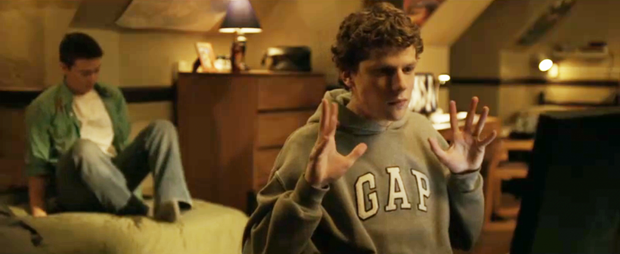Facebook. Chances are it’s not far from a computer screen near you. Just checked it? Up on a tab? It has become an essential social tool for most, an obsession for some and is now the subject of David Fincher’s latest movie, a film that takes us back to the origins of the social network that changed the way we act for good. Or at least until something better, newer and shinier comes along.
The film, based on Ben Mezrich’s The Accidental Billionaires, scripted by Aaron Sorkin (A Few Good Men, The West Wing, Charlie Wilson’s War) and directed by David Fincher (Seven, Fight Club, The Curious Case of Benjamin Button) tells the story of how the socially inept Mark Zuckerberg (Jesse Eisenberg) came to a site that united millions and ensuing court cases that he faced from best friend Eduardo Saverin (the lycra bound future Spidey, Andrew Garfield) and techno rivals, the Winklevoss twins (both played by Armie Hammer). Nerds have never seemed so cool.
The Social Network arrives on DVD on the back of a wave of critical praise and awards. Taking Best Picture and Best Original Score at the Golden Globes and Best Director and Best Adapted Screenplay at both the Globes and the Bafta’s give an indication of where the films strengths lie.
Sorkin’s script does a fantastic job of being witty, hurtling along at breakneck speed as well as explaining the techno jargon in such a way that, whilst not dumbing it down, makes it entirely comprehendible to hacker virgins everywhere. Sorkin takes us from dorm room to courtroom in the blink of an eye and the screenplay absolutely burns through its two hour running time in what feels like no time at all.
Reliably, Fincher gives The Social Network the all the style and verve of Fight Club but with the crisp polish of Button and as always gets great performances from his actors. (Remember this is the man who managed to get us in a room with Jodie Foster for two hours without the need for us to go all Buffalo Bill on her creeping in).
Jesse Eisenberg portrays Zuckerberg in a way that our opinions can’t help but shift throughout. He’s geeky, clearly socially inept and has issues with loyalty. Often rude to girls and even ruder to them once they highlight his flaws. On this evidence, it’s a struggle to like the guy. But his constant wit, hilarious put downs and a general aura that casts him as both the smartest and sharpest guy in the room make him someone you’d like to be friends with. On Facebook at least.
Those surrounding Eisenberg are equally impressive. Garfield
Despite the assured direction and impressive script, the films success lies in the simple reason that its ideas and merely what is on show is now a universal interest. It connects with almost anyone who watches it. As much as I loved Fight Club, I just can’t see myself up against a bare-chested Brad Pitt. (Female readers I’m sure are just trembling at the very image). The reason Annie Hall is my favourite movie of all time is that when I first watched it, I was Alvy Singer. In a similar fashion, The Social Network taps into ideas and experiences that we can all relate. On the surface, using Facebook. Blogging. But also ideas around friendship, the frailty of friendships, jealousy, jealousy between friends, wanting success and of course, being a nerd.
Facebook, of course, has plenty of enemies. So too, it appears, did Mark Zuckerberg. But in years to come, if it is seen as the general consensus that Facebook did more harm than good. Brought civilisation back thousands of years. Created generations that communicated with each other only via a virtual wall. Then at least, we can say, that two pretty amazing films were born out of it.
(Oh, the other being Catfish)
The Social Network. Billy Langsworthy ‘likes’ this.



